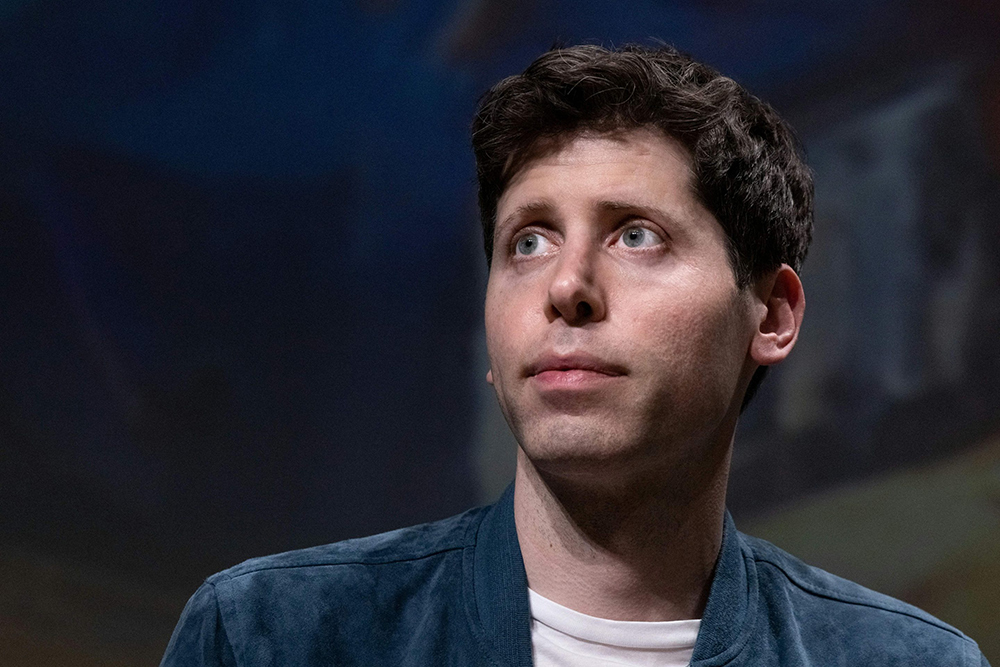
山姆·奧特曼支持的Worldcoin在周三公布了開發(fā)路線圖,其中包括用于支持其眼部掃描生態(tài)系統(tǒng)開發(fā)商的500萬美元撥款項(xiàng)目,以及其去中心化計(jì)劃的概況。不過,這個(gè)去中心化計(jì)劃對于這個(gè)雄心勃勃的資本密集
型項(xiàng)目來說是一個(gè)巨大的挑戰(zhàn)。
去中心化是加密貨幣的首要承諾之一。在傳統(tǒng)金融中,資金與交易由政府或銀行這類中間機(jī)構(gòu)掌控,但在加密貨幣構(gòu)建的未來中,各種系統(tǒng)則完全由密碼掌控。
最明顯的案例莫過于比特幣,這是首款遵循去中心化軟件協(xié)定的加密貨幣。它的基礎(chǔ)是名為區(qū)塊鏈的分類賬戶,記錄了每筆交易的信息。盡管其基礎(chǔ)設(shè)施由多家核心開發(fā)商維護(hù),但比特幣這一根基是無法改變的,而且可供任何人查閱。
隨著加密貨幣應(yīng)用的激增,去中心化理念卻變得越發(fā)微妙。畢竟,區(qū)塊鏈項(xiàng)目必須有一個(gè)發(fā)起方,而且即便這些項(xiàng)目會(huì)承諾打造更加去中心化的未來,但創(chuàng)建者通常會(huì)維持一定程度的控制、影響力,并提供一些激勵(lì)政策。
人形機(jī)器人是否預(yù)想過去中心化球體的面世?
作為加密貨幣最知名的項(xiàng)目之一,Worldcoin當(dāng)前便在努力應(yīng)對這個(gè)問題。該公司由山姆·奧特曼創(chuàng)建于2020年,它有一項(xiàng)充滿未來主義色彩的業(yè)務(wù),通過掃描虹膜來證實(shí)某人的“人類身份”,并向被掃描者贈(zèng)送一枚加密貨幣代幣作為獎(jiǎng)勵(lì)。隨著人工智能業(yè)務(wù)的增長,該項(xiàng)目希望創(chuàng)建一項(xiàng)機(jī)制,以便區(qū)分人類用戶和線上機(jī)器人,同時(shí)還要打造一個(gè)普遍基本收入系統(tǒng),以規(guī)避人工智能可能會(huì)導(dǎo)致的任何經(jīng)濟(jì)震蕩。
與眾多加密貨幣項(xiàng)目一樣,Worldcoin以去中心化協(xié)定自居,而且稱自己由全人類共同掌控,而不是僅由奧特曼或該公司財(cái)大氣粗的投資者安德里森·霍羅威茨等少數(shù)影響力人物說了算。受此影響,Worldcoin于2022年創(chuàng)建了Worldcoin Foundation,并將其作為該項(xiàng)目的非盈利性掌舵人。公司的業(yè)務(wù)發(fā)展仍由Tools for Humanity負(fù)責(zé),后者是一家盈利性實(shí)體,獲得了數(shù)千萬美元的風(fēng)投資本,并由奧特曼擔(dān)任其主席。
Worldcoin昂貴的流程為去中心化帶來了一個(gè)重大挑戰(zhàn)。其“個(gè)人身份證明”協(xié)定要求用戶接受其專屬球體的掃描,而這個(gè)球體造價(jià)數(shù)千美元。同時(shí),由于采集生物指標(biāo)數(shù)據(jù)會(huì)引發(fā)人們的隱私擔(dān)憂,因此需要開展嚴(yán)格的盡職調(diào)查。當(dāng)前,Tools for Humanity是該球體的獨(dú)家制造商,不過,公司已經(jīng)公開了該球體的設(shè)計(jì)內(nèi)容。
在接受《財(cái)富》雜志采訪時(shí), Tools for Humanity首席執(zhí)行官亞歷克斯·布拉尼亞與Worldcoin Foundation協(xié)定負(fù)責(zé)人雷姆科·布洛門講述了其愿景。在不久的將來,Tools for Humanity將成為球體的眾多生產(chǎn)商之一,而且開發(fā)者可以打造其他系統(tǒng)來驗(yàn)證用戶的人類特征,且無需進(jìn)行復(fù)雜的虹膜掃描。治理和決策將不再由Tools for Humanity或Worldcoin Foundation全權(quán)負(fù)責(zé),而是交給民主氛圍更加濃厚的去中心化自治機(jī)構(gòu)。
布洛門稱,大多數(shù)加密貨幣協(xié)定僅以軟件的形式存在,這意味著行業(yè)對集中化的定義“非常狹隘地局限于這種理想化的空間,即一切事物都是由密碼和數(shù)字來定義。為了實(shí)現(xiàn)去中心化,我們需要讓這個(gè)定義走出這個(gè)限定,從而將真實(shí)世界納入其中。”
撥款計(jì)劃是這一愿景的一部分,其資金在理論上會(huì)撥給能夠在Tools for Humanity外部推動(dòng)Worldconin發(fā)展的開發(fā)商。
然而,對于一個(gè)旨在于全球范圍內(nèi)顛覆身份和經(jīng)濟(jì)學(xué)認(rèn)知的項(xiàng)目來說,事實(shí)證明,要擺脫集中化的缺點(diǎn)將是十分困難的,即便Worldcoin Foundation與Tools for Humanity之間似乎也存在著千絲萬縷的聯(lián)系,因此也催生了一批令人感到困惑的實(shí)體機(jī)構(gòu)。這些機(jī)構(gòu)相互獨(dú)立,但卻又密不可分。例如,布洛門在加入Worldcoin Foundation之前便效力于Tools for Humanity。Worldcoin Foundation的三位董事中有兩名都是 Tools for Humanity的早期雇員。網(wǎng)站上并未提及第三位董事的姓名,也沒有提供Worldcoin Foundation剩余10名雇員的信息。
去中心化依然是一個(gè)模棱兩可的概念,對于監(jiān)管方而言更是如此。受此影響,Worldcoin選擇不在美國發(fā)行其代幣,原因是擔(dān)心違反美國證券交易委員會(huì)的規(guī)定。布拉尼亞對《財(cái)富》雜志說,考慮到不同利益相關(guān)方在定義上依然存在分歧,因此Worldcoin不會(huì)發(fā)布其去中心化目標(biāo)的時(shí)間表。(財(cái)富中文網(wǎng))
譯者:馮豐
審校:夏林
山姆·奧特曼支持的Worldcoin在周三公布了開發(fā)路線圖,其中包括用于支持其眼部掃描生態(tài)系統(tǒng)開發(fā)商的500萬美元撥款項(xiàng)目,以及其去中心化計(jì)劃的概況。不過,這個(gè)去中心化計(jì)劃對于這個(gè)雄心勃勃的資本密集型項(xiàng)目來說是一個(gè)巨大的挑戰(zhàn)。
去中心化是加密貨幣的首要承諾之一。在傳統(tǒng)金融中,資金與交易由政府或銀行這類中間機(jī)構(gòu)掌控,但在加密貨幣構(gòu)建的未來中,各種系統(tǒng)則完全由密碼掌控。
最明顯的案例莫過于比特幣,這是首款遵循去中心化軟件協(xié)定的加密貨幣。它的基礎(chǔ)是名為區(qū)塊鏈的分類賬戶,記錄了每筆交易的信息。盡管其基礎(chǔ)設(shè)施由多家核心開發(fā)商維護(hù),但比特幣這一根基是無法改變的,而且可供任何人查閱。
隨著加密貨幣應(yīng)用的激增,去中心化理念卻變得越發(fā)微妙。畢竟,區(qū)塊鏈項(xiàng)目必須有一個(gè)發(fā)起方,而且即便這些項(xiàng)目會(huì)承諾打造更加去中心化的未來,但創(chuàng)建者通常會(huì)維持一定程度的控制、影響力,并提供一些激勵(lì)政策。
人形機(jī)器人是否預(yù)想過去中心化球體的面世?
作為加密貨幣最知名的項(xiàng)目之一,Worldcoin當(dāng)前便在努力應(yīng)對這個(gè)問題。該公司由山姆·奧特曼創(chuàng)建于2020年,它有一項(xiàng)充滿未來主義色彩的業(yè)務(wù),通過掃描虹膜來證實(shí)某人的“人類身份”,并向被掃描者贈(zèng)送一枚加密貨幣代幣作為獎(jiǎng)勵(lì)。隨著人工智能業(yè)務(wù)的增長,該項(xiàng)目希望創(chuàng)建一項(xiàng)機(jī)制,以便區(qū)分人類用戶和線上機(jī)器人,同時(shí)還要打造一個(gè)普遍基本收入系統(tǒng),以規(guī)避人工智能可能會(huì)導(dǎo)致的任何經(jīng)濟(jì)震蕩。
與眾多加密貨幣項(xiàng)目一樣,Worldcoin以去中心化協(xié)定自居,而且稱自己由全人類共同掌控,而不是僅由奧特曼或該公司財(cái)大氣粗的投資者安德里森·霍羅威茨等少數(shù)影響力人物說了算。受此影響,Worldcoin于2022年創(chuàng)建了Worldcoin Foundation,并將其作為該項(xiàng)目的非盈利性掌舵人。公司的業(yè)務(wù)發(fā)展仍由Tools for Humanity負(fù)責(zé),后者是一家盈利性實(shí)體,獲得了數(shù)千萬美元的風(fēng)投資本,并由奧特曼擔(dān)任其主席。
Worldcoin昂貴的流程為去中心化帶來了一個(gè)重大挑戰(zhàn)。其“個(gè)人身份證明”協(xié)定要求用戶接受其專屬球體的掃描,而這個(gè)球體造價(jià)數(shù)千美元。同時(shí),由于采集生物指標(biāo)數(shù)據(jù)會(huì)引發(fā)人們的隱私擔(dān)憂,因此需要開展嚴(yán)格的盡職調(diào)查。當(dāng)前,Tools for Humanity是該球體的獨(dú)家制造商,不過,公司已經(jīng)公開了該球體的設(shè)計(jì)內(nèi)容。
在接受《財(cái)富》雜志采訪時(shí), Tools for Humanity首席執(zhí)行官亞歷克斯·布拉尼亞與Worldcoin Foundation協(xié)定負(fù)責(zé)人雷姆科·布洛門講述了其愿景。在不久的將來,Tools for Humanity將成為球體的眾多生產(chǎn)商之一,而且開發(fā)者可以打造其他系統(tǒng)來驗(yàn)證用戶的人類特征,且無需進(jìn)行復(fù)雜的虹膜掃描。治理和決策將不再由Tools for Humanity或Worldcoin Foundation全權(quán)負(fù)責(zé),而是交給民主氛圍更加濃厚的去中心化自治機(jī)構(gòu)。
布洛門稱,大多數(shù)加密貨幣協(xié)定僅以軟件的形式存在,這意味著行業(yè)對集中化的定義“非常狹隘地局限于這種理想化的空間,即一切事物都是由密碼和數(shù)字來定義。為了實(shí)現(xiàn)去中心化,我們需要讓這個(gè)定義走出這個(gè)限定,從而將真實(shí)世界納入其中。”
撥款計(jì)劃是這一愿景的一部分,其資金在理論上會(huì)撥給能夠在Tools for Humanity外部推動(dòng)Worldconin發(fā)展的開發(fā)商。
然而,對于一個(gè)旨在于全球范圍內(nèi)顛覆身份和經(jīng)濟(jì)學(xué)認(rèn)知的項(xiàng)目來說,事實(shí)證明,要擺脫集中化的缺點(diǎn)將是十分困難的,即便Worldcoin Foundation與Tools for Humanity之間似乎也存在著千絲萬縷的聯(lián)系,因此也催生了一批令人感到困惑的實(shí)體機(jī)構(gòu)。這些機(jī)構(gòu)相互獨(dú)立,但卻又密不可分。例如,布洛門在加入Worldcoin Foundation之前便效力于Tools for Humanity。Worldcoin Foundation的三位董事中有兩名都是 Tools for Humanity的早期雇員。網(wǎng)站上并未提及第三位董事的姓名,也沒有提供Worldcoin Foundation剩余10名雇員的信息。
去中心化依然是一個(gè)模棱兩可的概念,對于監(jiān)管方而言更是如此。受此影響,Worldcoin選擇不在美國發(fā)行其代幣,原因是擔(dān)心違反美國證券交易委員會(huì)的規(guī)定。布拉尼亞對《財(cái)富》雜志說,考慮到不同利益相關(guān)方在定義上依然存在分歧,因此Worldcoin不會(huì)發(fā)布其去中心化目標(biāo)的時(shí)間表。(財(cái)富中文網(wǎng))
譯者:馮豐
審校:夏林
The Sam Altman–backed Worldcoin announced a development road map on Wednesday, including a $5 million grants program to support developers in its eye-scanning ecosystem, as well as an outline of its plans to decentralize—a steep challenge for the ambitious and capital-intensive project.
Decentralization is a core promise of crypto. Rather than traditional finance, where money and transactions are controlled by governments or intermediaries like banks, crypto acolytes promise a future where systems instead are governed by code.
The best example is Bitcoin, the first cryptocurrency that functions as a decentralized software protocol. Although its infrastructure is maintained by a core set of developers, the foundation of Bitcoin—the decentralized ledger called a blockchain that records every transaction—is immutable and viewable by anyone.
As the applications of crypto have proliferated, the idea of decentralization has become trickier. A project has to originate from somewhere, after all, and the creators often maintain some degree of control, influence, and incentives, even as they promise a more democratized future.
Do androids dream of decentralized orbs?
Worldcoin, one of the most prominent projects in crypto, is currently grappling with the question. Cofounded by Sam Altman in 2020, it has a futuristic premise of proving someone’s “personhood” by scanning their iris, and giving them a crypto token as a reward. As the presence of artificial intelligence grows, the project hopes to create both a mechanism to differentiate between human users and bots online as well as a system of universal basic income to stave off any economic upheaval created by AI.
Like many crypto projects, Worldcoin has positioned itself as a decentralized protocol that will be in the hands of all of humanity, not just powerful figures like Altman and the deep-pocketed investors like Andreessen Horowitz who backed the company. As such, Worldcoin created the Worldcoin Foundation in 2022 to serve as a nonprofit steward of the project. Its development is still maintained by Tools for Humanity, the for-profit entity that’s received hundreds of millions in venture funding and counts Altman as its chairperson.
The costly process of Worldcoin presents a key challenge to decentralization. Its “proof-of-personhood” protocol requires users to be scanned by its proprietary orb, which costs thousands of dollars to produce, and concerns around privacy due to the capture of biometric data require a high degree of due diligence. Currently, Tools for Humanity is the only manufacturer of the orbs, although the project has made its designs open-source.
In an interview with Fortune, Tools for Humanity CEO Alex Blania and Worldcoin Foundation head of protocol Remco Bloemen laid out their vision. In the not-so-distant future, Tools for Humanity would be just one of many manufacturers of the orbs, and developers could create another system to verify users’ humanness that didn’t involve complicated iris scans. Governance and decision-making would no longer be concentrated in Tools for Humanity, or even the Worldcoin Foundation, and instead through a more democratically inclined DAO, or decentralized autonomous organization.
Most crypto protocols only exist as software, meaning that the industry’s definition of centralization is “very narrow-mindedly focused into this platonic space where everything is defined by cryptography and numbers,” said Bloemen. “What we need to do in order to make this work is push that definition out to actually include the real world.”
The grants program is part of the vision, with funding theoretically going to developers who could expand Worldcoin’s development outside Tools for Humanity.
Still, for a project that’s aiming to upend global conceptions of identity and economics, escaping accusations of centralization will prove difficult. Even the Worldcoin Foundation seems inextricably tied to Tools for Humanity, creating a confusing knot of entities both independent and intertwined. Bloemen, for example, worked at Tools for Humanity before joining the Worldcoin Foundation. Two of the Worldcoin Foundation’s three directors were both early Tools for Humanity employees. The third is not named online, nor are the rest of Worldcoin Foundation’s 10 or so employees.
Decentralization remains a slippery concept, especially for regulators, which has meant that Worldcoin chose not to launch its token in the U.S. for fear of running afoul of the Securities and Exchange Commission. Blania told Fortune that Worldcoin is not releasing a timeline for its decentralization goals because of the gulf in different stakeholders’ definitions.






